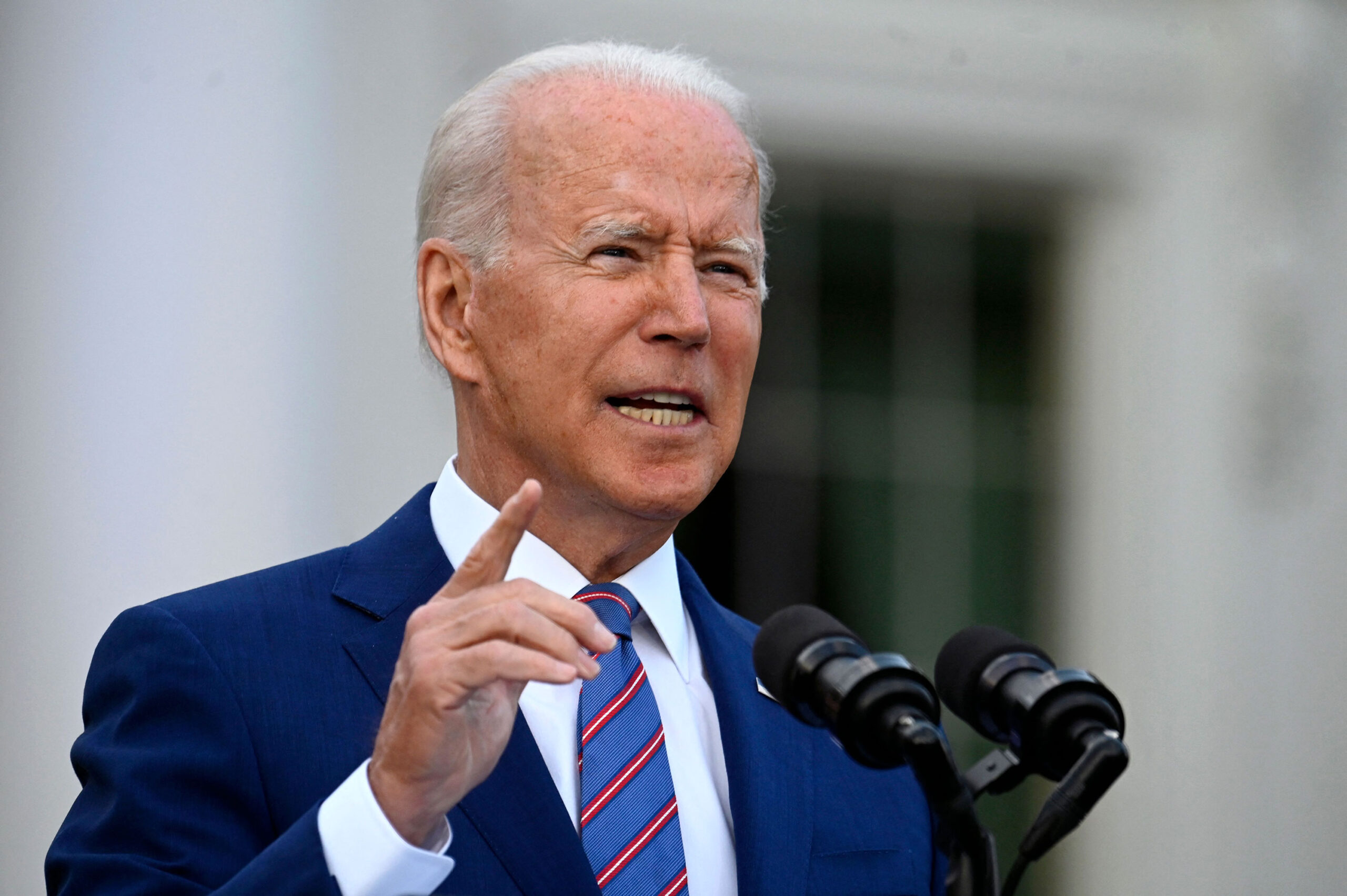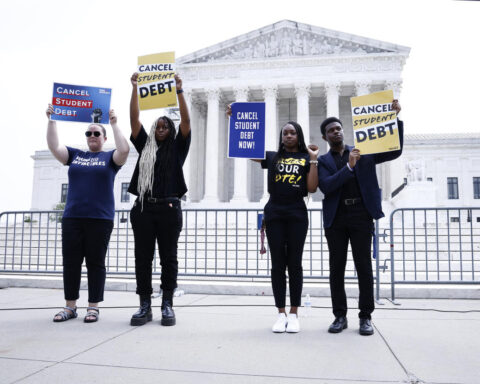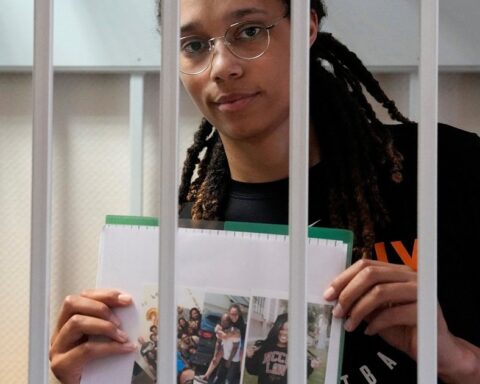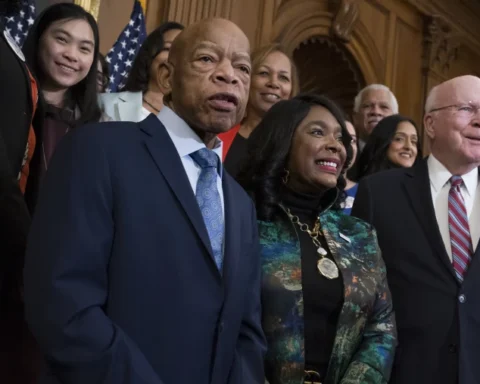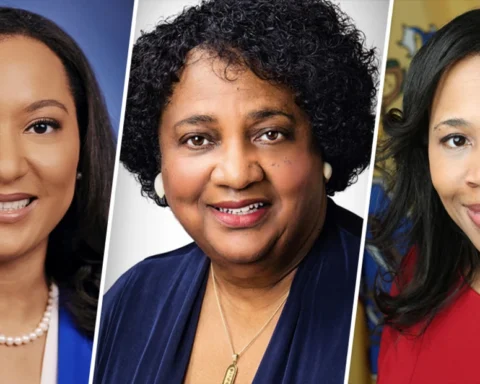Leaders of eight civil rights organizations warned President Joe Biden on Thursday that time is running short to enact new voting rules protecting Americans’ right to cast ballots.
The dire message, delivered during a candid session in the White House Roosevelt Room, came as Democrats clamor for the President to do and say more on the issue after defeats in Congress and the Supreme Court.
Biden and his team have repeatedly previewed a major push on voting rights after Senate Republicans blocked a sweeping election reform bill last month. Biden told reporters last week he planned on “speaking extensively” on voting rights, along with “going on the road on this issue.”
So far, however, a major address or trip hasn’t materialized. Instead, Biden has brought in outside advocates for meetings at the White House and has consulted advisers on the best strategy for combating restrictive new laws.
He has also tasked Vice President Kamala Harris, at her request, with leading White House efforts on the issue. Harris, who joined Thursday’s meeting, announced earlier in the day a $25 million expansion of a voting rights effort spearheaded by the Democratic National Committee.
In their meeting, which stretched longer than the hour allotted, Biden and Harris were advised by leaders of civil rights organizations that their voices were needed urgently.
“We emphasized to the President that our backs are against the wall,” said Sherrilyn Ifill, the president of the NAACP Legal Defense Fund, who attended the meeting alongside other leaders of civil rights organizations.
“This is the moment. There is no more time,” Ifill said. “We must have legislation. We must have the President use his voice, use his influence, use his power, and use what he clearly understands about this moment.”
The Rev. Al Sharpton, president of National Action Network, said leaders told Biden in the meeting that a growing wave of activism would mount in the coming weeks. He described the session as “very candid, no holds barred.”
“If we don’t put the street heat on it won’t happen,” he said of voting rights legislation. “We informed them this is going to come not from the White House down but from our houses up.”
Pressure has mounted on the White House and Democrats to do more to protect voting rights after a Supreme Court decision limited the ability of minorities to challenge state laws they say are discriminatory under the Voting Rights Act.
The high court ruling came as several Republican-led states, encouraged by former President Donald Trump‘s unfounded claims of widespread voter fraud, are considering more restrictive laws and Democrats are fighting a frantic battle in courts to combat what Biden has called an “assault on democracy.”
The Department of Justice has filed a lawsuit against a new voting law in Georgia, and voting rights advocates have encouraged the administration to take similar steps in other states.
Ahead of the meeting, a White House official said Biden is “absolutely revolted by these attempts to undermine the constitutional rights of Americans, especially people of color.”
Still, it remains unclear how much Biden can accomplish in protecting voting rights. Passing new voting legislation in Congress will almost certainly require altering filibuster rules, since Democrats’ slim majority in the Senate isn’t enough to overcome GOP opposition. Moderate Democrats have opposed major changed to the rules, making the future of new voting laws unclear. Biden has also stopped short of supporting elimination of the filibuster, but has expressed openness to making filibusters harder to execute.
The groups Biden met on Thursday included the NAACP, National Coalition for Black Civic Participation, National Urban League, National Action Network, NCNW, Leadership Conference for Civil & Human Rights and Lawyers’ Committee for Civil Rights Under Law.
Earlier Thursday, in a speech at Howard University, Harris announced a $25 million expansion of the Democratic National Committee’s “I Will Vote” campaign.
“Your vote matters. Your voice matters. Your will matters and regardless of who you are, where you live, what party you belong to — your vote matters. Your vote is your power,” Harris told the audience.
She added, “We will not let anyone take away our power and that’s why we are all here together today. We’re not gonna let that happen. And so we need to fight back.”
Biden has said his efforts must go beyond simply limiting dark money in politics or making Election Day a federal holiday — two items included in the major bill blocked by Republicans last month. He said in June that Democratic efforts must expand to limit the ability of election boards to toss out results or replace officials based on ideology.
“This is about who gets to judge whether your vote counted after it’s been cast,” he said at the time, claiming Republican voting boards were attempting to throw out votes if they don’t like the results. “That’s never happened before. It’s wrong.”
He was responding to questions on June 24 following the defeat of the sweeping voting and elections bill in Congress. Biden said in his answer he would be “going around the country” to “make the case” for advancing voting rights. Later, his press secretary said he would speak more on the issue the following week.
Last week, however, Biden’s schedule didn’t include a public event on voting rights. Officials said scheduling conflicts — including a trip to visit families affected by the condo collapse in Florida — prevented him from delivering the formal remarks he’d previewed.
Instead, he met behind closed doors with his senior advisers and key experts to discuss “anti-voter legislation.”
Speaking after meeting with families in Florida, Biden again said he planned a major push on voting rights.
“I think that it is critical that we make a distinction between voter suppression and suspension. The ability of a state legislative body to come along and vote vote to change who is declared the winner, I find to be somewhat astounding,” he said. “I’ll have much more to say about that because I plan on speaking extensively on voting rights as well as going on the road on this issue.”
Asked on Thursday when Biden might speak publicly on the matter, press secretary Jen Psaki couldn’t say.
“He conveyed he wants to speak to the country about voting rights and how he is going to address it moving forward. I don’t have any scheduling updates for you today,” she said.
